-
REVIEW07-29-2024
Telenursing in the postoperative period: a scoping review
Revista Brasileira de Enfermagem. 2024;77(3):e20240066
Abstract
REVIEWTelenursing in the postoperative period: a scoping review
Revista Brasileira de Enfermagem. 2024;77(3):e20240066
DOI 10.1590/0034-7167-2024-0066
Views0See moreABSTRACT
Objectives:
to map available evidence on telenursing use in the postoperative period and its impact on patient outcomes.
Methods:
a scoping review, conducted according to the JBI model and the PRISMA-ScR checklist. The search was carried out in the CINAHL, Embase, LILACS, PubMed, Web of Science, SciELO, Scopus and Cochrane Library databases.
Results:
twelve studies were included, published between 2011 and 2023, 66.6% of which were in developed countries. Of the positive outcomes, we highlight improved levels of disability, autonomy and quality of life, lower rates of post-operative complications, pain and reduced costs. Telephone monitoring was the most widely used modality, but there were few studies in the pediatric context and in Brazil.
Conclusions:
of the studies, 11 (91.6%) identified at least one positive outcome in telenursing use and none showed negative aspects in the postoperative period. The role of nurses in digital health needs further study.

-
ORIGINAL ARTICLE07-29-2024
Sexual counseling for people with acute coronary syndrome: educational video development
Revista Brasileira de Enfermagem. 2024;77(3):e20230416
Abstract
ORIGINAL ARTICLESexual counseling for people with acute coronary syndrome: educational video development
Revista Brasileira de Enfermagem. 2024;77(3):e20230416
DOI 10.1590/0034-7167-2023-0416
Views0See moreABSTRACT
Objective:
to assess validity evidence of an educational video on safe sexual activity after acute coronary syndrome.
Method:
study in three phases: video development; content validity analysis by 11 experts; and analysis of validity based on response processes by seven people with coronary disease. The content validity ratio (CVR) was calculated with critical values for the second phase of 0.63 and for the third of 1.0.
Results:
the video addressed the importance of resuming sexual activity and positions that consume less energy, clinical warning signs, the importance of adhering to treatment and a welcoming environment for sexual practice. A CVR above the critical value was obtained with a total of 4 minutes and 41 seconds.
Conclusion:
the educational video brings together adequate content validity evidence and can be used as a tool for patients after acute coronary syndrome.
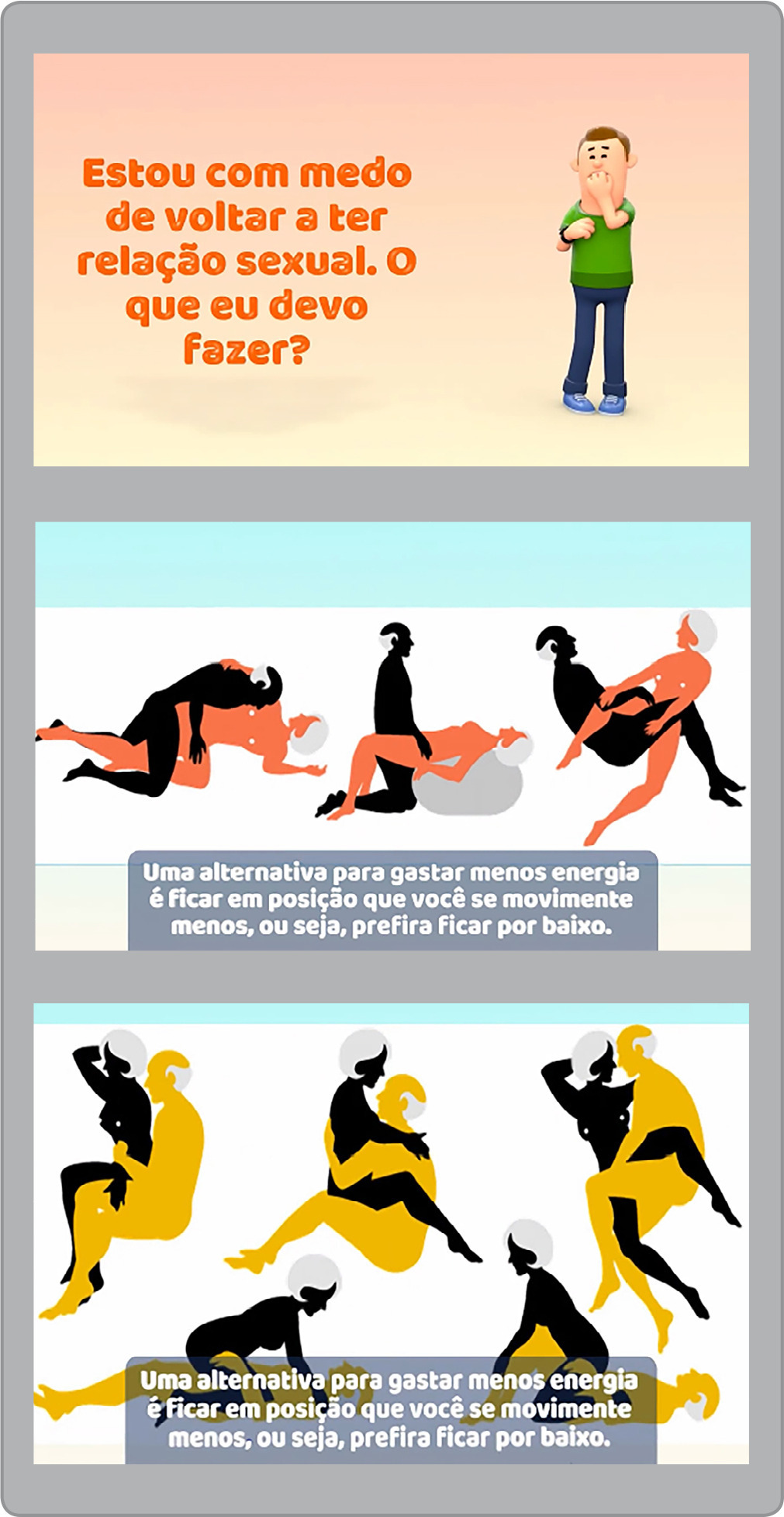
-
ORIGINAL ARTICLE07-29-2024
Evaluation of software technical quality for collecting data from patients under palliative care
Revista Brasileira de Enfermagem. 2024;77(3):e20230435
Abstract
ORIGINAL ARTICLEEvaluation of software technical quality for collecting data from patients under palliative care
Revista Brasileira de Enfermagem. 2024;77(3):e20230435
DOI 10.1590/0034-7167-2023-0435
Views0See moreABSTRACT
Objectives:
to evaluate software technical quality for collecting data from patients under palliative care.
Methods:
this is methodological technology evaluation research, according to the technical standard International Organization for Standardization/International Electrotechnical Commission 25040-2011, developed from August 2021 to August 2023. Eight nurses and eight information technology professionals participated as judges, who evaluated six quality characteristics and 23 subcharacteristics. Items that reached a percentage of agreement greater than 70% were considered suitable.
Results:
the characteristics evaluated by nurses/information technology professionals received the following percentages of agreement, respectively: functional suitability (94%-84%); reliability (100-70%); usability (89.9-66.8%); performance efficiency (95.8%-86.1%); compatibility (95.8-79.6%); and safety (96%-83.4%).
Conclusions:
the software was considered suitable in quality evaluation to offer support to nurses in collecting patient data under palliative care, with the potential to operationalize the first Nursing Process stage.
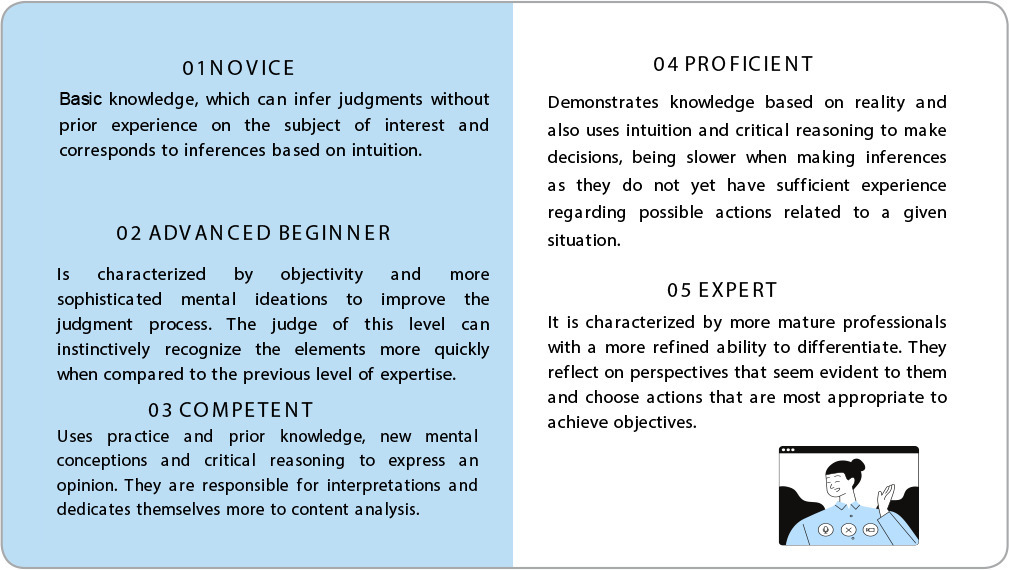
-
ORIGINAL ARTICLE07-29-2024
Mental health of parents of children and adolescents who require special health care
Revista Brasileira de Enfermagem. 2024;77(3):e20230457
Abstract
ORIGINAL ARTICLEMental health of parents of children and adolescents who require special health care
Revista Brasileira de Enfermagem. 2024;77(3):e20230457
DOI 10.1590/0034-7167-2023-0457
Views0See moreABSTRACT
Objective:
To identify the manifestations presented by parents of children and adolescents who require special health attention that can impact their mental health.
Methods:
exploratory, qualitative research, based on the concept of vulnerability, with data collection carried out through interviews with 18 parents of children and adolescents with special health care needs, hospitalized in the pediatric ward of a hospital in Paraná, between May/2017 and May/ 2018. Data analyzed by inductive thematic analysis.
Results:
parents experienced situations of vulnerability when providing care at home, with repercussions on their mental health, expressed by manifestations of lack of protection, anxiety and depression.
Final considerations:
It is important that health professionals seek to expand actions to promote care and reduce situations that generate threats, insecurities, concerns and damage to the health of parents, which can impact and further weaken care for children and adolescents who need attention especially health.
-
ORIGINAL ARTICLE07-29-2024
Disrupted mother-fetus dyad risk in high-risk pregnancies: a Middle-Range Theory
Revista Brasileira de Enfermagem. 2024;77(3):e20230464
Abstract
ORIGINAL ARTICLEDisrupted mother-fetus dyad risk in high-risk pregnancies: a Middle-Range Theory
Revista Brasileira de Enfermagem. 2024;77(3):e20230464
DOI 10.1590/0034-7167-2023-0464
Views0See moreABSTRACT
Objectives:
to develop and evaluate a Middle-Range Theory for the nursing diagnosis “Disrupted Mother-Fetus Dyad Risk” in high-risk pregnancies.
Methods:
this methodological study was conducted in two stages: theory development and evaluation. Dorothea Orem’s General Nursing Model was used as the theoretical-conceptual foundation. Evaluation was conducted using the Delphi method with seven judges, and consensus was achieved when the Content Validity Index of the evaluated items was ≥ 0.80.
Results:
the theory identified 20 elements of the nursing diagnosis “Disrupted Mother-Fetus Dyad Risk” (10 risk factors, 4 at-risk populations, and 6 associated conditions), 14 propositions, and 1 pictogram. After two rounds of evaluation, the theory was considered consistent, with consensus reached for all items, each achieving a Content Validity Index ≥ 0.80.
Conclusions:
the Middle-Range Theory included biopsychosocial factors explaining the nursing phenomenon “Disrupted Mother-Fetus Dyad Risk,” which aids in nurses’ diagnostic reasoning.
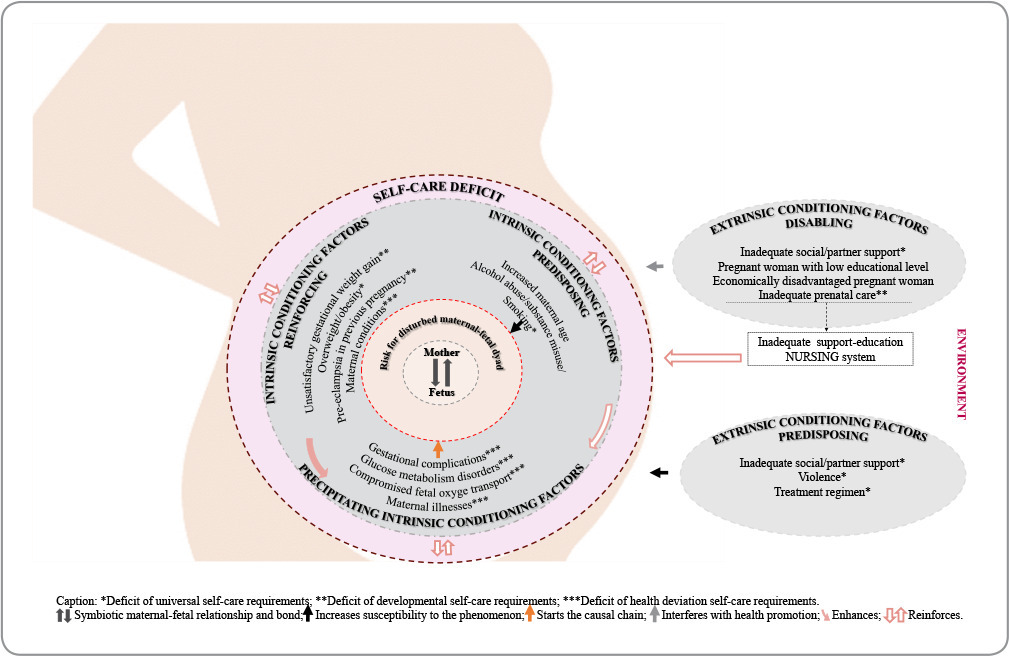
-
ORIGINAL ARTICLE07-29-2024
Completeness of variables in Hospital-Based Cancer Registries for prostatic malignant neoplasm
Revista Brasileira de Enfermagem. 2024;77(3):e20230467
Abstract
ORIGINAL ARTICLECompleteness of variables in Hospital-Based Cancer Registries for prostatic malignant neoplasm
Revista Brasileira de Enfermagem. 2024;77(3):e20230467
DOI 10.1590/0034-7167-2023-0467
Views0See moreABSTRACT
Objectives:
to analyze the completeness of variables from Hospital-Based Cancer Registries of cases of prostate neoplasm in the Oncology Care Network of a Brazilian state between 2000 and 2020.
Methods:
an ecological time series study, based on secondary data on prostate cancer Hospital-Based Cancer Registries prostate. Data incompleteness was classified as excellent (<5%), good (between 5%-10%), fair (10%-20%), poor (20%-50%) and very poor (>50%), according to the percentage of lack of information.
Results:
there were 13,519 cases of prostate cancer in the Hospital-Based Cancer Registries analyzed. The variables “family history of cancer” (p<0.001), “alcoholism” (p<0.001), “smoking” (p<0.001), “TNM staging” (p<0.001) had a decreasing trend, while “clinical start of treatment” (p<0.001), “origin” (p=0.008) and “occupation” (p<0.001) indicated an increasing trend.
Conclusions:
most Hospital-Based Cancer Registries variables showed excellent completeness, but important variables had high percentages of incompleteness, such as TNM and clinical staging, in addition to alcoholism and smoking.
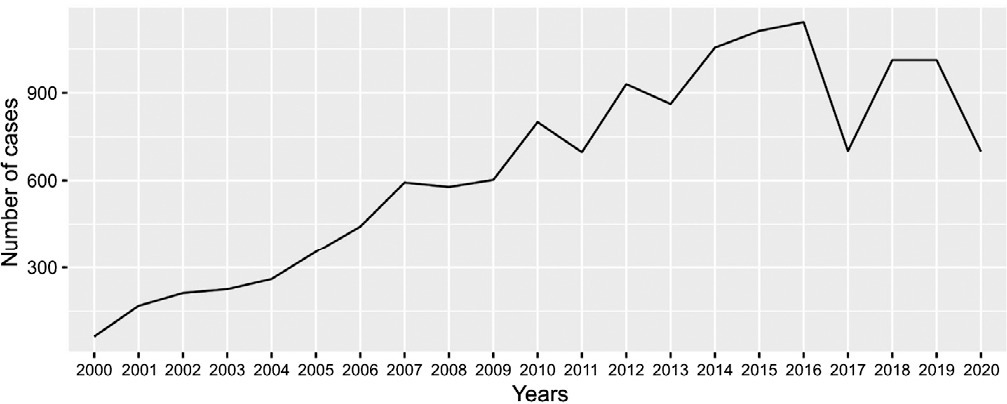
-
ORIGINAL ARTICLE07-29-2024
Contribution of informal caregivers to self-care in individuals with heart failure
Revista Brasileira de Enfermagem. 2024;77(3):e20230492
Abstract
ORIGINAL ARTICLEContribution of informal caregivers to self-care in individuals with heart failure
Revista Brasileira de Enfermagem. 2024;77(3):e20230492
DOI 10.1590/0034-7167-2023-0492
Views0See moreABSTRACT
Objectives:
to evaluate the contribution of informal caregivers to the self-care of individuals with heart failure.
Methods:
a cross-sectional study was conducted with 87 caregivers from March to October 2022 in the city of João Pessoa/PB. The caregivers’ contribution was assessed using the Caregiver Contribution to Self-Care of Heart Failure Index instrument. Scores ≥ 70 points indicate adequate contribution. Data were analyzed using descriptive statistics and Spearman’s correlation.
Results:
the sample consisted of 81.6% female caregivers. Median scores obtained for the self-care contribution scales were: 63.3 for maintenance; 55.5 for management; and 66.6 for confidence. Caregivers never or rarely recommended monitoring body weight, regular physical exercise, extra use of diuretics, and fluid restriction.
Conclusions:
informal caregivers showed inadequate contribution in the areas of maintenance, management, and confidence in self-care of individuals with heart failure.
-
REVIEW07-29-2024
Profile of scientific production on nursing technology construction, validity and application: a bibliometric study
Revista Brasileira de Enfermagem. 2024;77(3):e20230452
Abstract
REVIEWProfile of scientific production on nursing technology construction, validity and application: a bibliometric study
Revista Brasileira de Enfermagem. 2024;77(3):e20230452
DOI 10.1590/0034-7167-2023-0452
Views0See moreABSTRACT
Objective:
to analyze the profile of scientific production on nursing technology construction, validity and application.
Methods:
this is a bibliometric study, carried out in six databases, based on the Methodi Ordinatio application, arranged in nine stages. To represent the findings, the VOSviewer® software was used.
Results:
346 studies were identified, obtained from BDENF, CINAHL, EMBASE, LILACS, PubMed/MEDLINE, Scopus and Web of Science. There was a predominance of the English language, and 20% of the authors hold more than 25% of studies. Only two journals account for 25% of studies in the period studied. Twenty-six studies were selected for the InOrdinatio classification. Nursing Process (23%) stood out among the studies. The most produced technology was software (27%), and 50% of works describe construction and validity.
Conclusions:
there is an emphasis on the creation of educational technologies, especially information technology. The data demonstrates opportunities for future research in the area.

-
ORIGINAL ARTICLE12-13-2019
Factors related to quilombola attendance to child follow-up appointments
Revista Brasileira de Enfermagem. 2019;72:9-16
Abstract
ORIGINAL ARTICLEFactors related to quilombola attendance to child follow-up appointments
Revista Brasileira de Enfermagem. 2019;72:9-16
DOI 10.1590/0034-7167-2017-0605
Views0ABSTRACT
Objective:
To understand factors interfering with the attendance of quilombola children to growth and development follow-up appointments.
Method:
It is a qualitative research based on Symbolic interactionism, during which 14 mothers of children bellow 1 year-old were interviewed, who attended to the Family Health Unit at Ilha de Maré, Bahia, Brazil.
Results:
Appointment attendance is affected by factors intrinsic to mothers (meaning of child health follow-up; association between appointments and children falling ill; personal issues) and extrinsic factors, related to the service (availability, long waiting time for appointments and its quality).
Final considerations:
An administration prioritizing the service’s organization is required, which can prioritize attendances and the reduction of waiting time, specially given the personal issues that compromise going to the unit.
Keywords:Child CareGrowth and DevelopmentInterpersonal RelationsNursing in Community HealthPublic HealthSee more -
ORIGINAL ARTICLE07-18-2022
Cultural adaptation and content validity evidence of the Nutritional Literacy Scale Brazilian version
Revista Brasileira de Enfermagem. 2022;75(6):e20210657
Abstract
ORIGINAL ARTICLECultural adaptation and content validity evidence of the Nutritional Literacy Scale Brazilian version
Revista Brasileira de Enfermagem. 2022;75(6):e20210657
DOI 10.1590/0034-7167-2021-0657
Views0ABSTRACT
Objective:
To investigate the evidence of content validity and reliability of the Brazilian version of the Nutritional Literacy Scale (NLS) after the cultural adaptation process.
Methods:
Psychometric study of 1,197 users of the National Health Service (Brazilian SUS). The NLS was culturally adapted to Brazilian Portuguese and six items of the original scale were modified to improve its understanding, giving rise to the Brazilian version of the scale named NLS-BR. The analysis of evidence of content validity of the NLS-BR was performed using the Item Response Theory (IRT).
Results:
The final version of the NLS-BR had 23 items and proved to be adequate to assess nutritional literacy in adults assisted by the Brazilian SUS.
Final considerations:
The NLS-BR proved to be of adequate understanding and demonstrated evidence of content validity and reliability for users of the Brazilian SUS.
Keywords:Food and Nutrition EducationHealth LiteracyNutritional SciencesPsychometricsValidation StudiesSee more
-
ORIGINAL ARTICLE12-13-2019
Nurses’ experiences in the care of high-risk newborns: a phenomenological study
Revista Brasileira de Enfermagem. 2019;72:111-117
Abstract
ORIGINAL ARTICLENurses’ experiences in the care of high-risk newborns: a phenomenological study
Revista Brasileira de Enfermagem. 2019;72:111-117
DOI 10.1590/0034-7167-2018-0221
Views0See moreABSTRACT
Objective:
To describe nurses’ experience in the care of high-risk newborns.
Method:
This is a descriptive study with a qualitative approach, based on Merleau-Ponty’s phenomenology and performed at the Fernando Magalhães Maternity Hospital in the state of Rio de Janeiro, through interviews with 30 nurses who work in neonatal care, according to the phenomenological thinking of Maurice Merleau- Ponty.
Results:
Three categories emerged: “experienced body of the nurse practitioner on the high-risk newborn”; “experienced world of the nurse practitioner on the high-risk newborn”; and “time spent by the nurse practitioner with the high-risk newborn”.
Final considerations:
The study allowed us to describe, through the participants’ speeches, that the care of the high-risk newborn is broad, that is, objective, subjective and carried out with advanced technologies, their experiences and scientific improvement are composed of shared practice and theory with the family, professionals and beginners in the neonatal universe, favoring a differentiated and humanized care.
-
ORIGINAL ARTICLE08-16-2021
Management in clinical simulation: a proposal for best practices and process optimization
Revista Brasileira de Enfermagem. 2021;74:e20200515
Abstract
ORIGINAL ARTICLEManagement in clinical simulation: a proposal for best practices and process optimization
Revista Brasileira de Enfermagem. 2021;74:e20200515
DOI 10.1590/0034-7167-2020-0515
Views0See moreABSTRACT
Objectives:
to develop a best practices document with facilitating components and processes for simulation management.
Methods:
the methodological research was conducted between April and October 2017, using four approaches: observational research, conducted in an international simulation institution; Definition of theoretical framework, from the International Nursing Association for Clinical Simulation and Learning; integrative literature review, in international databases; and comparative analysis. It used Bardin’s analysis for the categorization of the information.
Results:
creation of a document with good practices in simulation regarding management and practice in simulation and management of resources and data, highlighting the use of technology and the training of professionals as the most important allies for overcoming the main limitations found.
Final Considerations:
the product of this study is a compilation of strategies for simulation management as a tool to enhance the application of the method with greater effectiveness.
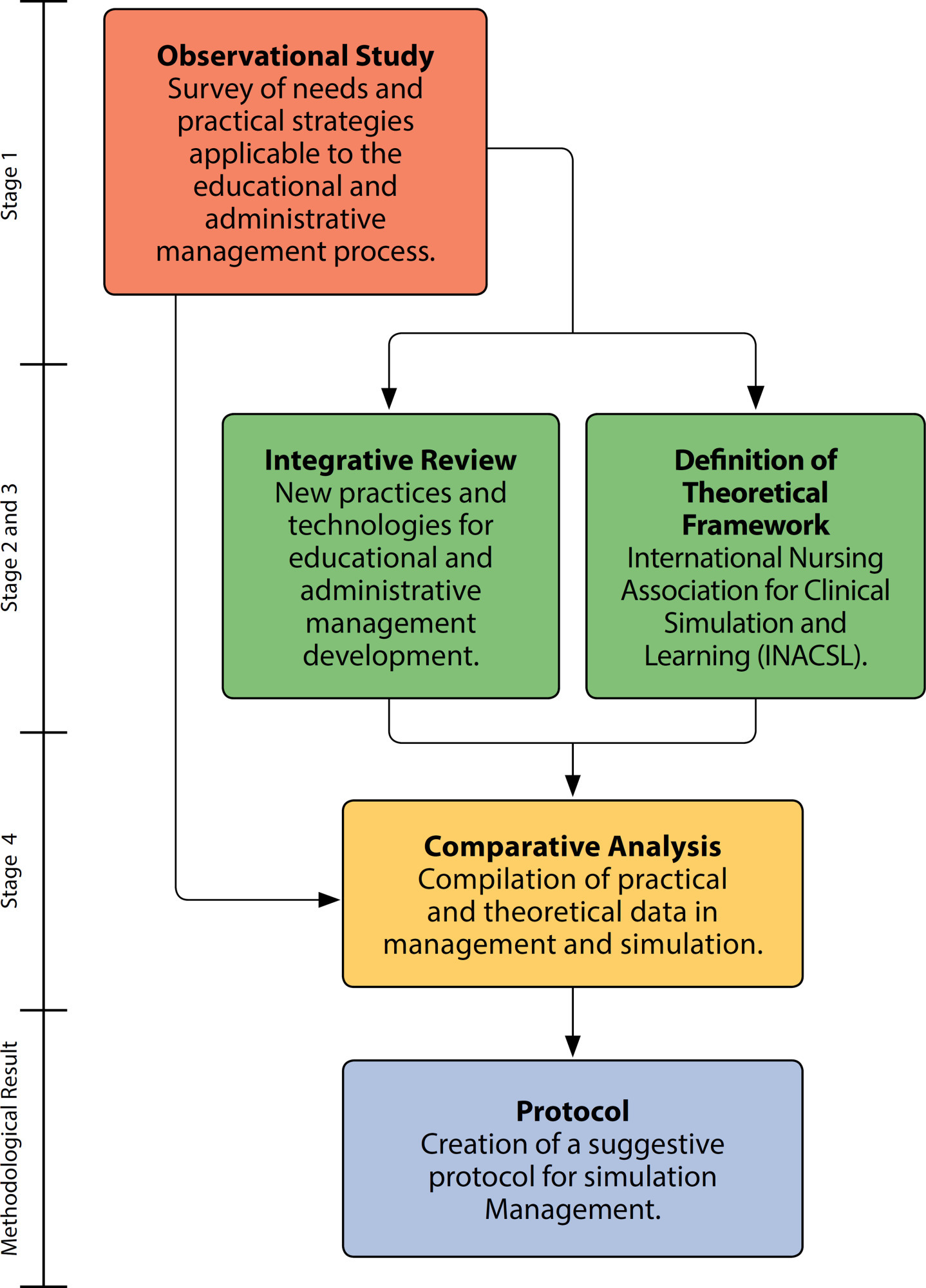
-
EXPERIENCE REPORT02-25-2022
Production and use of educational technologies in nursing post-graduation
Revista Brasileira de Enfermagem. 2022;75(5):e20210510
Abstract
EXPERIENCE REPORTProduction and use of educational technologies in nursing post-graduation
Revista Brasileira de Enfermagem. 2022;75(5):e20210510
DOI 10.1590/0034-7167-2021-0510
Views0See moreABSTRACT
Objective:
To report, under the light of Gardner’s Theory of Multiple Intelligences, the experience of students with advanced educational practices, involving the production and use of technologies in the postgraduation nursing course of the Universidade Federal de Pernambuco.
Methods:
Experience report of students from the post-graduation nursing program from the Universidade Federal de Pernambuco, about the production of knowledge using educational technology and the application of active methodologies in the teaching-learning process for face-to-face and distance teaching.
Results:
The post-graduate students participated in the educational process in a creative way, both during in-person and distance teaching. They created: domino games, educational videos, parodies, conceptual maps, virtual role-playing, an interactive quiz, among others.
Final considerations:
The experience of the students with the advanced educational practices, including the production and use of technologies in nursing post-graduation showed that the teaching-learning process can be innovative and planned to go beyond traditional methods.
-
ORIGINAL ARTICLE09-01-2021
Clinical Decision-Making in Nursing Scale (CDMNS-PT©) in nursing students: translation and validation
Revista Brasileira de Enfermagem. 2021;74:e20210032
Abstract
ORIGINAL ARTICLEClinical Decision-Making in Nursing Scale (CDMNS-PT©) in nursing students: translation and validation
Revista Brasileira de Enfermagem. 2021;74:e20210032
DOI 10.1590/0034-7167-2021-0032
Views0See moreABSTRACT
Objectives:
to validate, for the Portuguese population, the Clinical Decision-Making Nursing Scale© (CDMNS©).
Methods:
this methodological study involved 496 nursing students who filled in a questionnaire created using sociodemographic and academic data, and the scale to evaluate the making of decisions in nursing.
Results:
the confirmatory factorial analysis showed that the adjustment of the factorial structure has good quality, being made up by three factors (X2/gl = 2.056; GFI = 0.927; CFI = 0.917; RMSEA = 0.046; RMR = 0.039; SRMR = 0.050). For the scale to be reliable, it had to include only the reliability of the scale required it to be constituted by 23 items, with correlation values that varied from 0.184 and 0.610, and a global Cronbach’s Alpha of 0.851, which showed its good reliability.
Conclusions:
the CDMNS-PT© is valid and reliable, showing a high potential to be used in clinical practice and investigation.

-
ORIGINAL ARTICLE08-08-2022
Health literacy and adherence to the pharmacological treatment by people with arterial hypertension
Revista Brasileira de Enfermagem. 2022;75(6):e20220008
Abstract
ORIGINAL ARTICLEHealth literacy and adherence to the pharmacological treatment by people with arterial hypertension
Revista Brasileira de Enfermagem. 2022;75(6):e20220008
DOI 10.1590/0034-7167-2022-0008
Views0See moreABSTRACT
Objective:
To analyze the association between health literacy and the adherence to the pharmacological treatment of Brazilians with arterial hypertension.
Methods:
Cross-sectional study with 234 participants who responded an on-line sociodemographic and clinical characterization questionnaire, in addition to evaluation of health literacy and of the adherence to their pharmacological treatment. Data were analyzed using descriptive statistics and difference and correlation tests.
Results:
People with post-graduation, who were actively working and did not smoke, had better health literacy results. Elders and those who were retired or lived on government subsidies adhered better to the medication treatment. There was a correlation between the numerical dimension (rs=0.189; p=0.004) and the global health literacy result (r2=0.170; p=0.009) with the adherence.
Conclusions:
A better numerical and global understanding of health literacy was associated with better adherence to arterial hypertension medication treatment.
-
REVIEW04-22-2020
Health advocacy and primary health care: evidence for nursing
Revista Brasileira de Enfermagem. 2020;73(3):e20180987
Abstract
REVIEWHealth advocacy and primary health care: evidence for nursing
Revista Brasileira de Enfermagem. 2020;73(3):e20180987
DOI 10.1590/0034-7167-2018-0987
Views0See moreABSTRACT
Objectives:
to analyze nursing actions involving health advocacy in the context of primary health care and the consolidation of this right to health.
Methods:
this is an integrative literature review with content analysis of the results on health advocacy and its relationship with nursing in the context of primary health care.
Results:
the content analysis of the seven selected studies resulted in two thematic categories: “Right to health – a complex and progressive consolidation movement in Brazil” and “Advocacy in health and nursing”.
Conclusions:
despite the difficulties in defining the concept of health advocacy, nurses, in their practice, act with innovative alternatives to daily conflicts, exercising the users’ right to health in their relationships with health team members and the community.

Search
Search in:
Nuvem de Tags
Aged (144) Atenção Primária à Saúde (239) COVID-19 (104) Cuidados de Enfermagem (269) Educação em Enfermagem (151) Educação em Saúde (139) Enfermagem (930) Estudos de Validação (131) Health Education (144) Idoso (208) Mental Health (149) Nursing (987) Nursing Care (306) Patient Safety (151) Primary Health Care (284) Qualidade de Vida (104) Quality of Life (106) Saúde Mental (145) Segurança do Paciente (150) Validation Studies (108)



